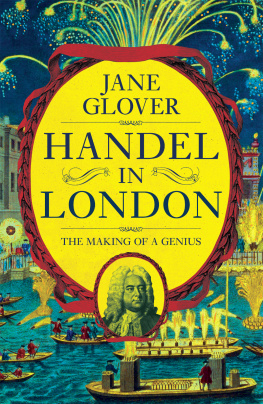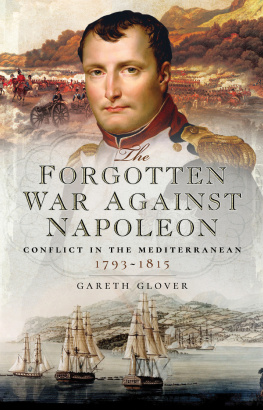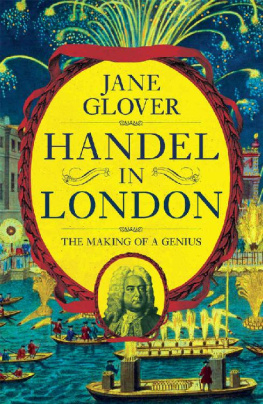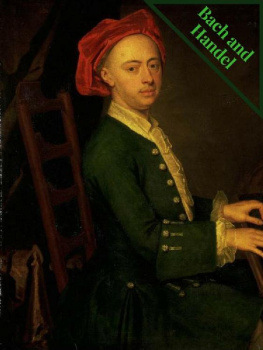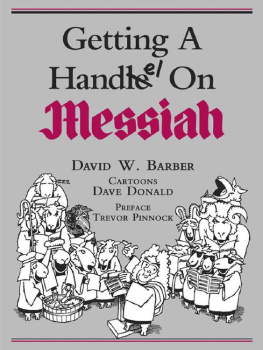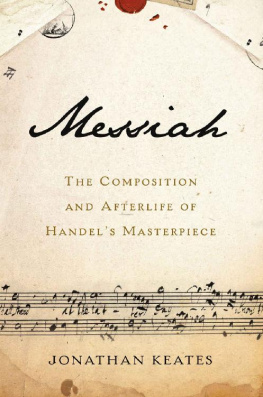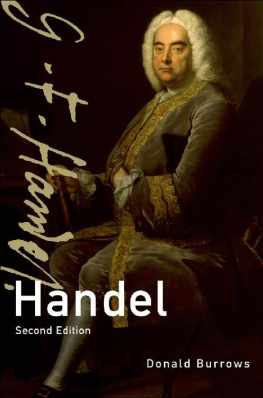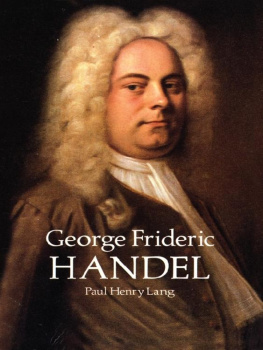Contents
List of Illustrations
Foreword
In Lincoln Cathedral one Christmas, I heard my first Messiah. I was nine years old. It swept me away, and at that moment I knew not only that my life would be suffused with music, but that Handel, and Messiah, would represent recurring themes in it.
In adulthood, I have duly spent more than forty years as a professional musician, working in opera companies and with orchestras and concert organizations, and Handel has indeed occupied a sizeable portion of my activity and my repertoire. I have conducted his operas and oratorios all over the world, including, as it happens, over one hundred performances of Messiah. A considerable part of the job of performing these great works is the assembly and preparation of singers, and, especially if the presenting organization offers repeated opportunities to develop a company, in the creation of teams to operate to the best of individual and combined abilities. To a much lesser extent (for there are whole departments these days devoted entirely to this task), I have been involved too in the courting of financial support, and the building of audiences. There is a whole part of being a performer which has nothing at all to do with actual performance.
In the eighteenth century, Handel encountered exactly the same obligations. Working at the heart of London musical activity for several astonishing decades, he not only composed masterpiece after masterpiece, but he carefully selected individual singers and musicians to deliver them, and moulded these disparate talents into companies that would, with modifications and evolutions, serve him repeatedly for several projects and over several seasons. To a large extent he was self-taught. In his early years, before his arrival in London, he had been presented with preselected casts of singers. He had assessed them and prepared them, but he had learned from them too about their capabilities, their limitations and their temperaments, and their weaknesses had been as educational as had their strengths. Just as, in those formative years, he had absorbed every musical influence and learned to define excellence, so he had developed a truly impressive ability to understand the human voice.
By the time of Handels arrival in London, still only in his mid-twenties, he was already a real connoisseur of singers, and knew how to bring out the best in them. Like Mozart, who claimed that an aria should fit a singer like a well-cut suit of clothes, Handels musical tailoring, once he had heard and assessed a voice, was exemplary. Whether dealing with an established star or a young beginner of raw promise, he was ever alert to colour, texture, range and contour. With a star, the relationship could be tetchy or even exasperatingly explosive: he famously threatened to throw the highly gifted but tiresome Italian soprano Francesca Cuzzoni out of a window if she disobeyed him, and there were many complaining stories about his dictatorial way of maintaining the highest possible standards. Handel nevertheless wrote to the strengths of his stars and achieved exquisite results with them. Then as now, it was not actually necessary to like an artist in order to make great music together. But his relationships with singers at the start of their careers, whose artistry he truly enabled, developed and triumphantly displayed, no doubt gave him infinitely more satisfaction. He trained their technique and guided them in expressive style and interpretation, and he encouraged them to inhabit their roles rather than simply recite them. In effect, he taught his singers to act, and similarly he could teach actors to sing. Susanna Cibber, for example, was an actress who, especially in collaboration with the great David Garrick, had considerable success on the London stage, but who, finding herself in Dublin when Handel was there giving the first ever performances of Messiah, was coached by him to deliver a legendary and affecting performance of He was despised. In all cases, it was a reciprocal process: the singers art inspired Handel to write in the way he did, and his music allowed that artistry to grow and prosper. But if, as does happen, a singer was in vocal distress or even crisis, Handel was especially sympathetic to this predicament too. Despite his reputation for severity, he was, without fail, sensitive to the vulnerable, and when a singer was in trouble, he would coax, rewrite, adapt and help.
From his earliest years, Handels own gifts had always attracted the attention and support of wealthy patrons willing to back him and his enterprises, and throughout his career he continued to cultivate and tend his royal and patrician subscribers, inspiring their loyalty and generosity. His own duty and obedience to his monarch runs as a strong thread through the long narrative of his London years, and, with certain members of the royal family, these were enhanced too by genuine friendship and therefore a personal commitment. A vibrant, extremely visible and well-connected member of London society, and one moreover who had a great flair for the making and handling of money, Handel understood (in a way that Mozart for example lamentably never did) the whole business side of artistic enterprise, and was able comfortably to interact with those who held the purse strings.
There were, to be sure, many rough passages and setbacks during the course of Handels lengthy and prolific career, but none would fell him for long. His resilience would steer him towards his next centre of activity, and his entrepreneurial skills would again and again create environments in which his projects could be realized. A man of fathomless invention, exquisite artistry, workaholic energy and an insatiable appetite for artistic and social delight, but indeed for good food and wine too he essentially travelled alone through life. Unlike Mozart, who wore his heart perpetually on his sleeve and wrote literally hundreds of letters which vividly, even startlingly, reveal his state of mind, Handel was intensely private, rarely confiding his true feelings in his own, much more restrained, letters. Insights beyond the public facade therefore have to be gleaned, at one stage removed, from the anecdotes of others, raising questions then of authenticity and reliability. So however much Handel was always surrounded by people, and some of his many colleagues and patrons did become his friends, there was a real sense in him of a solitary mission, of private goals. That he achieved so many of his goals and with such immortal consequences is a tribute not only to his incomparable compositional skills, but to every aspect of his musical professionalism.
For me this has been, as well as a detailed investigation into Handels activities and the context in which they happened, something of a personal process, for so much of what I do now is so similar to what he did then. Observing the manner in which he dealt with each situation as it arose effectively, seeing with his eyes, and hearing with his ears is still enormously instructive. Across the generations, Handel the professional musician and craftsman continues to educate and inspire.
Authors Note
1. NAMES: Many of the people appearing in this book anglicized their names when they settled in London. For clarity, I refer to its main subject as George Frideric Handel throughout. (Even after his British naturalization, his name continued to be spelled in a number of ways.) For others, including the Hanoverian royal family, I have retained their German names until the point at which they themselves either were compelled or chose to change them.

